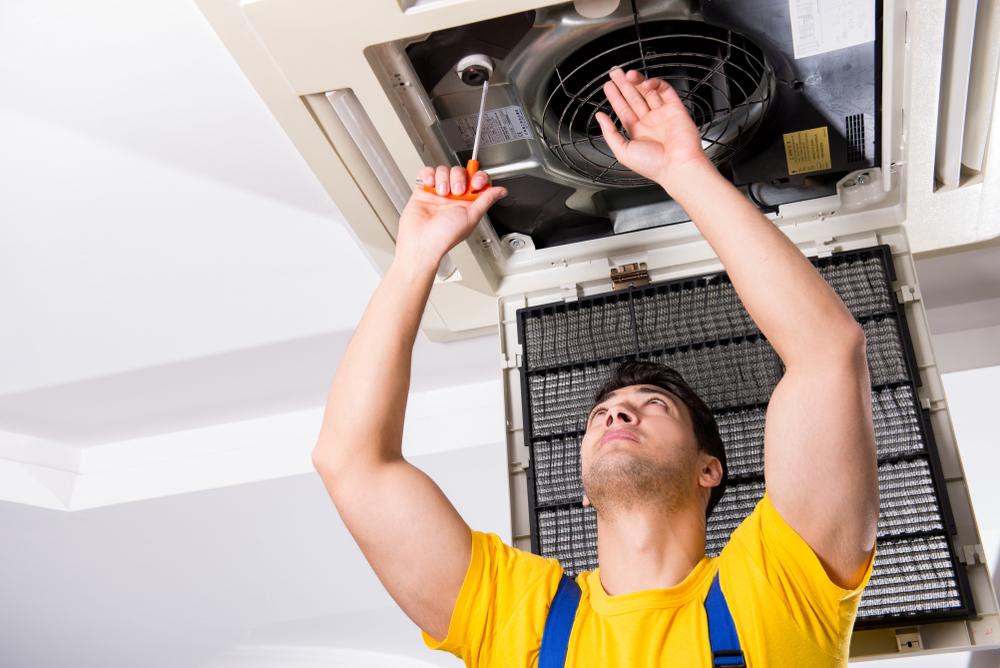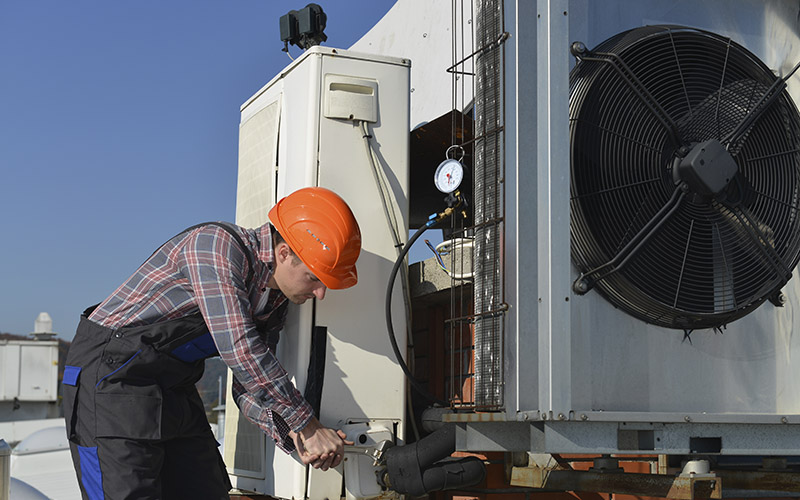A Complete Guide to Installing ductless mini splits in Any Climate
A Complete Guide to Installing ductless mini splits in Any Climate
Blog Article
Choosing In Between a Warmth Pump and Heater: Key Factors To Consider for Your HVAC Requirements
When examining heating alternatives for HVAC requires, the choice in between a heatpump and a heater can be complex. Each system uses distinctive advantages tailored to specific environments and power effectiveness goals. Understanding these distinctions is necessary for making an informed selection. Secret elements such as installment prices and ecological impact even more make complex the selection process. Which alternative genuinely aligns with one's convenience and sustainability choices? The complying with areas will certainly discover these considerations in detail.
Understanding Warm Pumps: Exactly How They Function and Their Advantages
While numerous house owners consider numerous home heating alternatives, comprehending exactly how heatpump feature and their benefits can substantially influence their choice. Heatpump operate by moving warm as opposed to producing it. In the winter season, they draw out warmth from the outside air or ground and transfer it inside your home, while in the summer, they reverse this process, cooling the home by getting rid of warm outside. This twin capability makes them functional for year-round climate control.One of the key benefits of warmth pumps is their power performance. They utilize considerably less power contrasted to conventional heating unit, possibly causing reduced utility costs (heat pump replacement ooltewah tn). Furthermore, warmth pumps have a smaller carbon footprint, making them an eco friendly selection. They also call for less upkeep than conventional systems, adding to long-term price savings. On the whole, recognizing the mechanics and advantages of heatpump can assist property owners make notified choices concerning their heating and cooling requirements
Checking Out Heaters: Kinds, Procedure, and Advantages
Furnaces can be found in numerous types, including gas, electrical, and oil models, each with unique operational devices. Comprehending these distinctions is necessary, as they impact effectiveness and home heating efficiency. Additionally, heating systems offer numerous benefits, such as regular heat outcome and integrity in colder environments.
Kinds of Heating systems
Furnace can differ considerably in style and procedure, with furnaces being a preferred option amongst property owners. There are several types of heaters, each using various gas resources and innovations. Gas furnaces are common, leveraging all-natural gas to create heat efficiently. Electric furnaces, on the other hand, use electrical resistance to generate warmth, often favored for their uncomplicated installment. Oil heaters, while less common, are reliable in locations with restricted gas access (ductless mini splits). In addition, condensing heating systems maximize energy effectiveness by recycling and catching exhaust gases. Each type runs via a system of heat exchangers and ductwork to distribute cozy air throughout a home. Recognizing the distinctions in between these heater kinds is necessary for educated a/c decisions
Benefits of Furnaces
For home owners seeking trustworthy heat during cold months, the advantages of heating systems are significant. Furnaces provide regular heating, making sure even temperature levels throughout the home. They are especially effective in extreme cool, usually exceeding warmth pumps in freezing conditions. Numerous types, including gas, electrical, and oil heating systems, supply versatility to satisfy diverse demands and preferences.Furnaces likewise have a tendency to have reduced preliminary setup expenses compared to warmth pumps, making them a much more easily accessible option for lots of. Their robust layout adds to a longer life-span, with several systems lasting over 15 years with appropriate upkeep. In addition, modern-day furnaces are typically outfitted with advanced innovation for improved effectiveness, which can cause lowered power expenses. In general, furnaces continue to be a reputable option for effective home heating.

Energy Effectiveness: Contrasting Warm Pumps and Furnaces
When contrasting energy performance in between warm pumps and furnaces, the Seasonal Power Efficiency Proportion (SEER) plays a vital function in determining efficiency. Additionally, an operational price evaluation reveals the long-lasting monetary ramifications of each system. Comprehending these elements can lead house owners in making informed choices regarding their home heating services.
Seasonal Power Performance Ratio
Power effectiveness plays a vital duty in the decision-making process in between heat pumps and heating systems, specifically when considering the Seasonal Power Efficiency Proportion (SEER) This metric procedures the cooling effectiveness of warm pumps over a whole air conditioning season, providing a standardized means to examine efficiency. Greater SEER rankings show greater energy efficiency, equating to lower energy consumption and reduced energy costs. On the other hand, heating systems are commonly analyzed utilizing the Yearly Fuel Usage Efficiency (AFUE) ranking, which shows heating performance. When comparing these 2 systems, home owners must prioritize SEER rankings for heatpump, as they directly influence overall energy financial savings and ecological sustainability. A comprehensive understanding of SEER can especially influence the long-lasting satisfaction and cost-effectiveness of the picked HVAC remedy.
Operational Expense Analysis
Recognizing the functional prices related to warmth pumps and furnaces is important for property owners examining their choices. Warm pumps commonly provide higher power performance, converting electric power right into heat with marginal waste. This results in lower regular monthly pop over to this site utility costs, particularly in moderate climates. Conversely, traditional heaters, especially gas designs, might have lower ahead of time costs but can sustain greater functional costs gradually due to fuel rates and performance ratings.Moreover, heatpump can operate as both home heating and cooling down systems, potentially reducing the requirement for different heating and cooling devices. While initial investments for heatpump might be greater, their long-term savings in power efficiency can make them a much more cost-effective selection for several households. Careful analysis of regional power rates is vital to determine the most effective option.
Setup Expenses: What to Anticipate for Each Heater
Setup prices for heating unit can differ substantially in between warm pumps and furnaces, influencing homeowners' choices. Heatpump typically have greater upfront installation costs, usually varying from $3,500 to $8,000, relying on the device size and intricacy of installation. This includes the exterior system, interior handling system, and essential ductwork adjustments. Conversely, furnaces have a tendency to have lower first prices, balancing between $2,500 and $6,000, which can be appealing for budget-conscious house owners. Installment costs you can try these out can raise if comprehensive ductwork is required.Moreover, the option of gas kind for furnaces-- natural gas, propane, or electrical-- can likewise influence setup costs. While heatpump provide power effectiveness, their first financial investment might discourage some purchasers. Ultimately, evaluating installation prices along with lasting financial savings and effectiveness will certainly assist homeowners in making educated choices concerning their heating unit.
Environment Considerations: Which System Does Better in Your Location
Just how do climate problems affect the performance of home heating systems? The performance of heatpump and heating systems can differ substantially depending upon the local climate. In modest environments, heat pumps excel by effectively moving warm from the outside air, making them an energy-saving choice. Nonetheless, their performance decreases in very chilly temperatures, where they may battle to draw out adequate warm. Conversely, heaters, particularly gas designs, supply regular and reliable warm regardless of outdoor problems, making them more effective in cooler regions.In areas that experience milder winters months, heatpump can operate successfully year-round, giving both heating & cooling. In comparison, regions with rough winters months typically gain from the effectiveness of heaters. Inevitably, recognizing the local climate is crucial when choosing between a warmth pump and a heater, as it directly impacts their functional performance and general efficiency.
Maintenance Demands: Long-Term Look After Warmth Pumps vs. Furnaces
While both heat pumps and heaters call for normal upkeep to guarantee peak efficiency, their specific demands and treatment regimens differ substantially. Heating systems normally require much less frequent attention, with yearly evaluations being sufficient to look for gas leakages, tidy filters, and evaluate general capability. Their easier layout typically permits for uncomplicated repairs.In contrast, heatpump require biannual upkeep because of their twin function in heating and cooling. This consists of cleaning coils, checking refrigerant levels, and ensuring that both the interior and outside units operate at their ideal. Furthermore, heatpump maintenance often includes even more intricate elements, making professional servicing essential.Neglecting upkeep can lead to lessened performance and enhanced power prices for both systems. Ultimately, property owners ought to consider these long-lasting treatment needs when choosing in between a warm pump and a heating system, as positive maintenance can prolong the life-span and efficiency of either system significantly.
Ecological Effect: Picking a Sustainable Heating Choice
The ecological impact of heating unit is a vital assessment for property owners seeking lasting choices. Heatpump are typically much more energy-efficient than conventional heaters, as they transfer warm instead than generate it, greatly lowering carbon exhausts. By utilizing eco-friendly energy resources, such as air-source or geothermal heatpump, homeowners can even more reduce their ecological footprint.On the other hand, all-natural gas furnaces give off greenhouse gases and add to air pollution, though they typically provide greater heat their explanation outcome. However, developments in technology have led to the development of high-efficiency furnaces that decrease emissions.Ultimately, picking a heater entails weighing performance against environmental influence. House owners are motivated to review regional power resources and incentives for renewable systems, making certain a selection that lines up with both individual convenience and environmental responsibility. The choice impacts not just prompt convenience but likewise long-term sustainability and environmental wellness.
Regularly Asked Inquiries
For How Long Do Heat Pumps and Furnaces Commonly Last?
The life-span of heatpump typically varies from 15 to two decades, while heaters can last between 15 to 30 years. Regular maintenance significantly impacts their longevity and efficiency in providing home heating options.
Can I Make Use Of a Warm Pump in Extremely Cold Climates?
Heatpump can run in incredibly chilly climates, but their performance reduces as temperature levels drop. In such problems, supplemental heating resources might be essential to preserve comfy interior temperatures and assure peak efficiency.

What Is the Sound Degree of Heat Pumps Versus Furnaces?
The noise degrees of heatpump and heating systems differ significantly. Typically, warmth pumps run even more silently than traditional furnaces, making them more effective for those sensitive to sound, while heating systems might produce louder functional noises during home heating cycles.
Are Warmth Pumps Suitable for Both Home Heating and Cooling?
Heatpump are certainly ideal for both home heating and air conditioning (ductless mini splits). They function by transferring heat, supplying efficient temperature level control year-round, making them a flexible choice for property owners seeking an all-in-one a/c remedy
What Dimension Furnace Do I Need for My Home?
Establishing the suitable dimension heater for a home needs assessing elements such as square video footage, insulation top quality, neighborhood environment, and the home's design. Consulting an expert can ensure an exact analysis and excellent comfort. Heat pumps generally use higher energy efficiency, transforming electrical power right into warm with minimal waste. In moderate environments, heat pumps succeed by successfully moving heat from the outside air, making them an energy-saving alternative. Conversely, heating systems, specifically gas versions, provide consistent and reliable warmth no matter of outside conditions, making them better in colder regions.In locations that experience milder winters, warmth pumps can run successfully year-round, offering both heating and cooling. Heat pumps are usually a lot more energy-efficient than standard heaters, as they move warm instead than produce it, greatly reducing carbon discharges. By making use of eco-friendly power sources, such as air-source or geothermal warmth pumps, home owners can better lessen their eco-friendly footprint.On the various other hand, natural gas heating systems give off greenhouse gases and add to air pollution, though they commonly offer greater warmth result.
Report this page